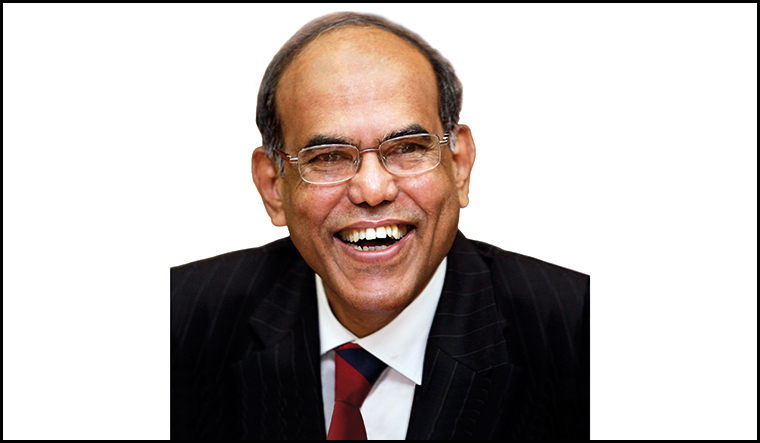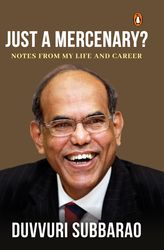Interview/ D. Subbarao, former Reserve Bank governor
From standing up to the Union government to defend the autonomy of the Reserve Bank of India to criticising the deteriorating quality of the civil services, Duvvuri Subbarao has never shied away from doing the heavy lifting. As his latest book, Just a Mercenary, hits headlines for his questioning the Comptroller and Auditor General’s interpretation of ‘presumptive loss’ in the 2G scam, THE WEEK caught up with the former bureaucrat, who also had served as finance secretary and secretary to the Prime Minister’s Economic Advisory Council. Excerpts from an exclusive interview:
Q/ The most satisfying and most traumatic part of your career, now looking back.
A/ I was posted as an officer on special duty for bottling liquor by the N.T. Rama Rao government in Andhra Pradesh in the mid-1980s. NTR was aghast at people drinking adulterated liquor, and losing lives and livelihoods. So he decided that the solution was to set up arrack bottling plants in every district, and I was appointed an officer on special duty for the project.
My first reaction was, why did they pick me? I had shown no special expertise for field projects, particularly for bottling liquor. I thought I was destined for bigger things―join the IAS and change the world. I was angry. I sat at home for three-four days, but then picked myself up. I said, ‘If I have to do this, I will do it. If I fail, that’s okay. But at least let me try.’ I completed the project three days ahead of the deadline. It was a tremendously satisfying experience.
And I learned many lessons. For example, that people should not fear being pushed out of their comfort zones. In fact, there are a lot of lessons to be learned from being pushed out of your comfort zone. In leadership training programmes, they tell you the secret to success in life is to discover your passion and follow it. But the lesson I learned is not so much to discover your passion and follow it, but to do whatever you have to do in life with passion.
Q/ With a lot of fundamental changes slated to happen, including delimitation, what would you say is the ideal way forward for the Centre-state balance of power?
A/ The amount that states can borrow has to be approved by the Union government. I believe those are good guidelines, although some states are protesting. States have to learn to be more self-sufficient and fall back on their own resources and see how they can raise additional taxes, improve governance, and improve the investment climate that will generate jobs and get more productive.
Q/ States also complain that with the GST, they don’t have control over revenue. Meanwhile, industry has been demanding that state subjects like excise and fuel also be included in the GST.
A/ I think the GST has been a great thing although we have had some implementation problems. As late finance minister Arun Jaitley said, it is a tribute to our fiscal federalism. The states and the Centre came together for the common good. I don’t think the GST should be seen as a mechanism that has actually detracted from the autonomy of states. That is the wrong way of looking at it. But, of course, states will complain―have you ever seen a hostel student who doesn’t complain about the hostel food? It is in their very nature to complain!
Q/ Richer states say they are not getting their due.
A/ There is some cross-subsidisation. For every rupee richer states like Maharashtra and Karnataka contribute to the central tax pool, they get back less than a rupee. Poorest states like Bihar and Jharkhand get more than a rupee for every rupee they contribute. That is necessary, even desirable, up to a certain extent. It happens in most other federations. It is incumbent on the richest states to cross-subsidise the poorest states.
But there has to be limits to it. And I get a sense that we are hitting the limits of that cross-subsidisation. There has to be some milestone set for the cross-subsidisation formula. It cannot go on forever.
Q/ We will have a new government soon. What are the areas it should focus on?
A/ I have a straightforward answer to that: We must focus on creating jobs.
The economy is growing at a sizzling pace, eight plus per cent year before last, 7.6 per cent last year, 7 per cent this year, estimated, and probably 6.5 per cent for the next two to three years. Yet, it is not creating jobs, because growth is coming from sectors that are not job intensive. Several economists who study these numbers have said that this pace of growth of 6.5 to 7 per cent is incompatible with the growth in consumption, which is just 3.5 per cent, which shows that there is unemployment and there is growing inequality. Unemployment and inequality are the two big problems and solving them is morally right, not just politically right. I believe it is good economics. We need to solve them because consumption is the biggest growth driver in India. We have about 300 to 500 million people who are middle class or lower middle class. If their incomes improve, they will spend that money. And when they spend that money, demand will go up. If demand goes up, production will go up, jobs will go up, that will generate more jobs and more growth. So, we need to focus on creating jobs and ensuring that benefits of growth are widely shared for our growth to be sustainable. It is an economic necessity.
We have not focused as much on job creation as on growth numbers. In fact, you are not seeing this debate in the election, it is all about reservations and freebies. How do you ensure that the benefits of the wealth creation accrue to the important segments of the population? Growth and inequality are two big problems that the next government must address.
Q/ You said growth is in areas that are not job-intensive. So which areas should the new government focus on?
A/ Let’s look at agriculture. Agriculture will not create jobs. In fact, there are about 70 to 80 million people, perhaps even more, in the agriculture sector, who are underemployed. If agriculture productivity improves as we want it to, agriculture will throw out 80 million to 100 million people. Those people will have to look at jobs outside.
Then there is the services sector. People think that the services sector is very job-intensive. But that view is shaped by the experience of a Bangalore or a Hyderabad, the software hubs. But if you actually dig deeper, you’ll find that software has created just about 7 million to 8 million jobs in a workforce of a billion. So the services sector jobs that have been created over the last 10 years are low-end jobs like security guards, cleaners and janitors. But we want higher-end jobs. So if agriculture and services are not the solution in the immediate future, we are going to fall back on manufacturing.
We know that large corporate investment is not job-intensive. But if large corporate private investment comes in, that will have a multiplier effect down the line. MSMEs and below MSMEs, even tiny enterprises. And those are job-intensive. That’s where we must be focusing on.
But on the supply side, we have to work on skills and on education. I told you about the labour that agriculture would throw out. They are going to be at best semi-skilled and they cannot be absorbed in the manufacturing sector right away. You have to make them job- ready. We have to attack the jobs problem from both the demand side and the supply side.
Just a Mercenary; Notes From My Life and Career
By Duvvuri Subbarao
Published by Penguin Viking
Price Rs799 (hardbound); pages 435



